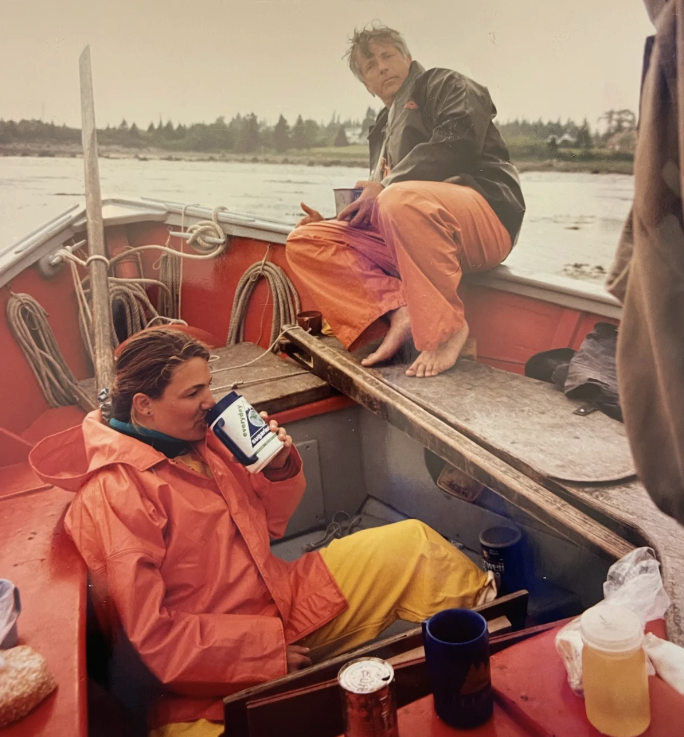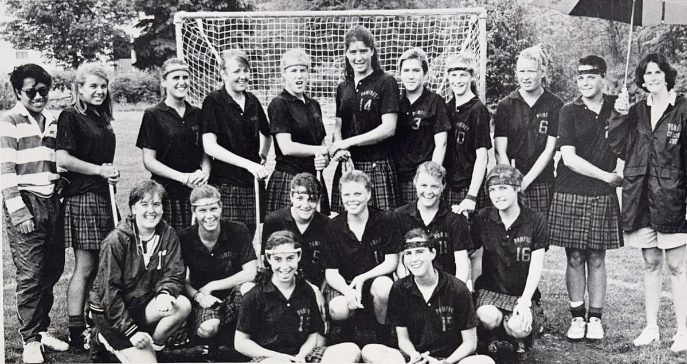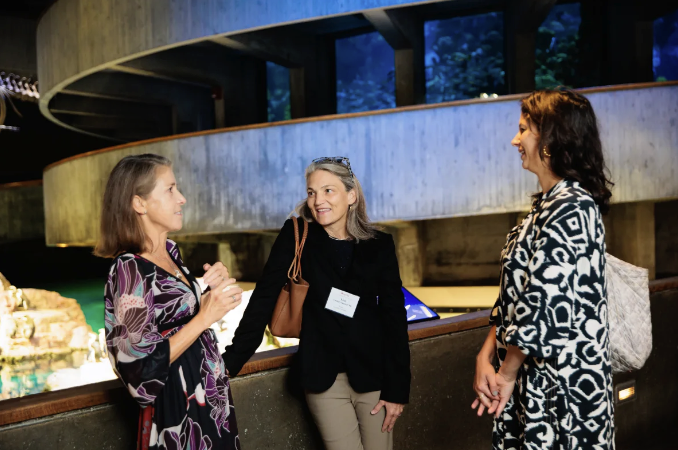CHANGE IS CONSTANT
Lisa Noble Kaneb has a passion for education that extends beyond the classroom.
Lisa Noble Kaneb ’86 has spent her life taking on the roles of instructor, trainer, facilitator, teacher, and coach. Her work has led her to Singapore, London, and across the United States. She believes in the importance of innovative education. If there is one thing that she has learned over the years it is that change is constant and nothing is static.
Tell me about your time at Pomfret.
High school is a wacky time. Change is constant and nothing is static. You are drafting yourself through new experiences. Pomfret’s administrators, teachers, coaches, and mentors offered a stable backdrop during my drafting of who I was learning to be. Pomfret became a home away from home, especially as it coincided with my parents splitting up. Having meals with and access to one’s teachers and coaches outside the classroom and seeing them in roles beyond teaching was quite influential. I made strides and mistakes in every area of life during high school. Certain classes stick with me to this day. Chris Atwood’s anatomy class required me to thoroughly know the entire body and inspired me to take a wilderness emergency medical technician course after college. Chick Cole connected art and art history to science, math, and anthropology.
Where did you study after Pomfret?
Inspired by my time in Chick Cole’s art and art history classes, I attended the University of Vermont and studied education and art. Art and art history visually convey different perspectives and understanding of history, society, nature, emotion, and much more. Some of my early courses in college are now similar to what is being taught at Pomfret today.
After earning your teaching degree, did you become a teacher?
I graduated at the start of a recession. I carved a few part-time teaching and coaching jobs together and worked as an instructor for Hurricane Island Outward Bound in the summer. The Outward Bound work led to working for Project Adventure, where I trained others to take part in rope courses and group challenges. There I gained a deeper knowledge of facilitation, conflict resolution, and organizational development. These experiences and skills launched my career working for two consulting firms, Sapient and Scient, that rapidly grew during the dot-com boom between 1998–2002. Coming full circle, in 2003, I returned to teaching and completed a master’s degree in education.

What did you love about your time as an Outward Bound instructor?
Living the five pillars of Outward Bound — enterprising curiosity, indefatigable spirit, tenacity in pursuit, readiness for sensible self-denial, and above all compassion — was invaluable training for navigating my 20s and 30s and still sticks with me today. I enjoyed getting to know people from many different backgrounds and seeing students find their challenges, discover their way forward, and grow from twelve individuals to a unified group that has formed an indelible experience and memory. Working outside 24/7, starting each day by jumping in the ocean, building a shelter on a thirty-foot, two-masted, open-pulling boat, and having very little yet everything you needed was an unforgettable experience. I wish everyone could experience something like this. It’s an amazing antidote and respite from the clutter of our busy world and constant media feeds.

Where does your enthusiasm for education come from?
It’s about making connections and being the cornerman in the boxing ring for your students. You want them to exceed beyond what they think they are capable of. In high school, some students are full of vulnerabilities and insecurities. Being there for them and encouraging and validating their understanding is so important. To be a good teacher, you need to be observant, a good listener, and, most of all, caring. The best teachers and coaches I have had did not feed answers or robotically drill the skill. It was their approach, process, and sharing of how strategies change as conditions change that inspired me. What fuels my reverence for teaching is the immense learning and expansion of perspectives and understanding I received from those I have coached, instructed, and facilitated.
Why do you think innovative teaching is important?
Our understanding, perspective, and knowledge about the world — what is in it and how we connect to it — changes as we learn. There are many different ways of seeing something, digesting it, and understanding it. The more ways you approach a problem, look at the information, break it down, and build it back up, the better your understanding will be and the greater the connections you can make. The teacher at the podium, as the only source of knowledge, is linear and limited. We all have different ways of processing, retaining, and expressing information. Innovative teaching values mistakes, and even more so, the response to the mistakes. In order to learn, there needs to be a balance of comfort and the foundation to take risks and be less than perfect.
Pomfret has many programs that help our students grow. Which do you wish they had when you were a Pomfret student?
Do I have to pick just one? I would have liked to participate in all of them! QUEST, The Helios Project, the Certificate Program, and the Global Studies all expand learning outside of the traditional classroom. These programs demonstrate examples of innovative learning and teaching. It’s cool to see the Helios website and photos of students on the ground floor, literally and figuratively building the Helios space and designing its purpose, reach, and impact. Pomfret’s 350 students and more than 100 teachers and staff involved in these programs, living together, and sharing the learning, challenges, and solutions is one of the reasons I am interested in keeping up with what is happening on the Hilltop.

You are a champion for Pomfret’s Amplify campaign, which seeks to advance teaching and learning. Why is that?
It was not until I was thirty-eight years old that I began to think about the School as an organization. I am impressed by the improvements, innovative approaches, and more inclusive culture. Former Head of School Bradford Hastings ’68 augmented and nurtured a stronger boarding school experience. Pomfret continues to adapt, question, and reflect. I see the current administration and faculty, led by Tim Richards, questioning and measuring how to improve teaching and learning. An organization that does not grow and change will get lapped while standing still.

